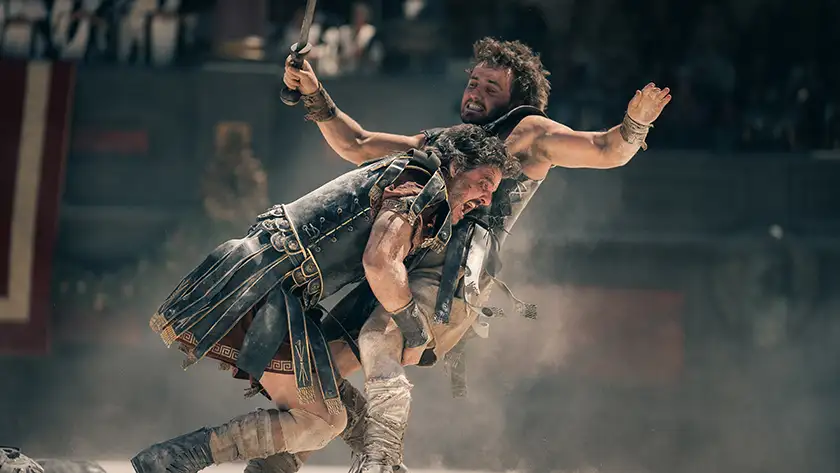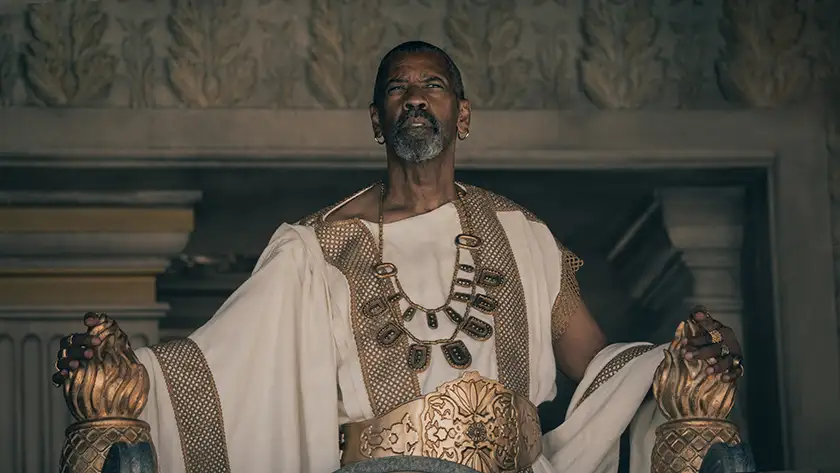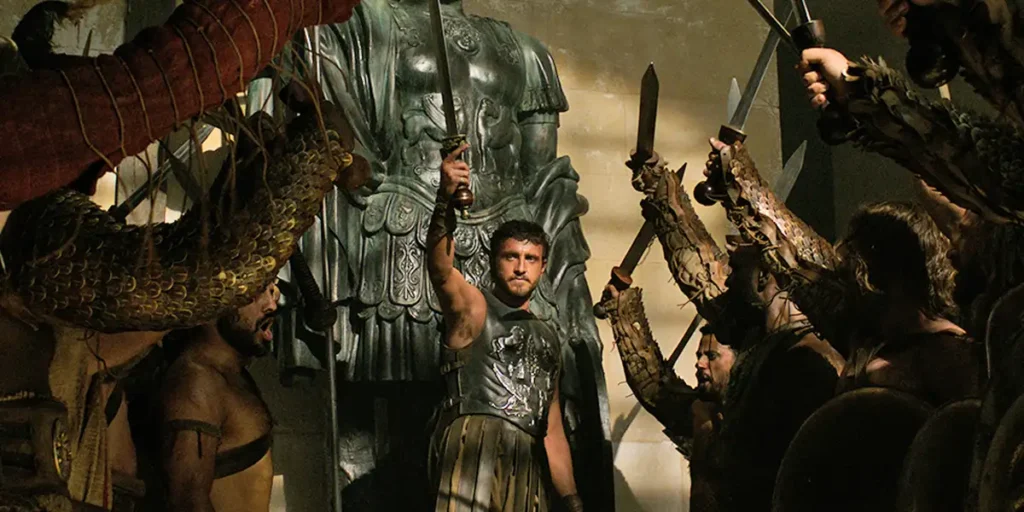With Gladiator II, Ridley Scott proves that at 86 years old, he can still make us reflect on humanity’s relationship with tyranny.
Director: Ridley Scott
Genre: Action Epic, Adventure, Drama
Run Time: 148′
U.S. Release: November 22, 2024
U.K. Release: November 15, 2024
Where to Watch Gladiator II: In US theaters and in UK & Irish cinemas
Gladiator II is not only guaranteed to entertain audiences but also spark a hunger to revisit the original. As grand and exciting as Gladiator (2000) was, what made the historical epic resonate with audiences was the profoundly personal journey of revenge that Maximus – revered Roman gladiator and hero – undergoes, portrayed beautifully by Russell Crowe. It isn’t just Maximus’ family murder that endears us, which is enough to push any protagonist on a vengeful path.
His effort to do right by his people, culminating in betrayal and his death in the Colosseum, is the perfect bittersweet storytelling that makes us keep coming back to this medium. Although it never reaches the highs of its predecessor, Gladiator II is an admirable attempt to recapture the action-packed and emotional scale that director Ridley Scott achieved 24 years ago.
It’s been sixteen years since Lucius (Paul Mescal, All of Us Strangers) witnessed the death of his father Maximus at the hands of his uncle, Emperor Commodus (Joaquin Phoenix). Guided by rage in his heart, Lucius now fights in the Colosseum following the death of his wife and the invasion of his home by the forces of Roman General Marcus Acaciusthe (Pedro Pascal, The Wild Robot). With the future of the Empire at stake after tyrannical Emperors Caracalla (Fred Hechinger, Thelma) and Geta (Joseph Quinn, A Quiet Place: Day One) have led it into chaos, Lucius must overlook his desire for vengeance and reflect on his past to find strength and honor to return the glory of Rome to its people.
Gladiator II is an impressive display of Scott’s craftsmanship. The film wastes no time throwing you in the middle of a battlefield, building riveting momentum lasting until the movie’s final moments. From fighting monkeys to naval battles inside the Colosseum, each set piece differs from the rest while channeling the exciting nature of Gladiator. The VFX work here feels far more digitalized than the original, though that’s not a dig at the VFX artists, just an observation. If certain action scenes in Gladiator carry a lot of weight because you can tell real tigers are chasing our heroes, that weight ain’t as prominent in Gladiator II because you never feel the VFX creatures pose an actual threat to Lucius. Bringing director of photography John Mathieson back for the sequel does help Gladiator II keep visual consistency, though, adding texture to the massive sets, detailed props, and gorgeous wardrobe.

The cast sells the personal conflicts and political intrigue with gravitas. What screenwriter David Scarpa comes up with for Paul Mescal and Pedro Pascal’s rivalry seems clichéd at first glance but is far more nuanced as the film unravels. It’s not as clean-cut as an evil general versus a dull hero – not that this was the case in the original, but it was more straightforward. Instead, Scarpa creates a conflict of interests where you don’t want to see either in a match to the death.
One is fueled by his blind need to take revenge on those who’ve wronged him, and the other is desperate to liberate Rome from its tyrants while still fulfilling the wishes of said villains. In a sense, Lucius and Marcus feel like an extension of Maximus’ legacy but presented in a way that showcases what happens when a government forces its people – who should be working together to overthrow their oppressors – to destroy each other. The rivalry can feel very one-sided, although that is the point of its poignant thematic throughline.
Connie Nielsen’s (Wonder Woman) Lucilla plays a more active role than in the 2000s installment. She’s the film’s emotional anchor, though her writing remains a tad generic. What you expect her character to go through is precisely what she experiences, leaving very little room for surprises in her arc. For what it’s worth, Nielsen does elevate the material, especially when sharing the screen with Mescal. Her outbursts are full of self-loathing and regret, illuminating Lucilla’s tragedy of having to live with her family’s legacy aiding Rome to be in the fragile state that it is in.
For all the entertainment value Gladiator II provides, it doesn’t always have the emotional weight the original carries. Like Maximus, Lucius’ wife is taken away from him, but because the movie is so eager to get us back in the gladiator arena, it rushes through key character moments. I understand his wife’s passing is essentially a plot device to get him to Rome. However, by making his initial motivations weak, Mescal’s Lucius can come off as one-note, even if the actor tries to add more depth than what’s on the page. Fortunately, once Lucius is reunited with his mother Lucilla, his writing improves significantly. Although, it does make you question why his relationship with his mother was not his primary motivation from the beginning rather than a throwaway love interest.
Structural hiccups like this are what hold Gladiator II from being stellar. The movie is a perfect example of a fast-paced runtime working against its advantage. I wish the film had slowed down to let character dynamics breathe. Quinn and Hechinger’s pair of Emperors suffer the most from this, feeling particularly underdeveloped. They both play malice rather well, but unlike Joaquin Phoenix as Emperor Commodus, the material does not support their performances. I think this is a symptom of a larger issue: there is too much going on in Gladiator II. Scott spends so much time trying to make you guess whether the film’s antagonists are the twin Emperors, Pascal’s Marcus, or Denzel Washington’s (The Equalizer 3) Macrinus – a gladiator slave owner – that by the time it provides an answer, the movie already became too busy.

None of these issues prevent Gladiator II from being a thought-provoking blockbuster, though. Washington has earned a lot of praise for his work here, and rightfully so. He’s the glue that makes the political landscape of Rome incredibly relevant today. The energy the legendary actor brings is intoxicating, jumping between charisma and pure hatred toward anyone who gets in his way. He uses the flawed relationships and tragedies of others to advance his ambitions. Everyone in the cast is great, but Washington is operating on a different level, and ultimately, makes the movie’s complexity shine by highlighting what happens when a man manipulates the truth for his political gain.
What I’m about to say might feel disconnected from Gladiator II, but I feel compelled to address it before closing this review because it is embedded in Washington’s Macrinus and the film as a whole. Sitting through Ridley Scott’s sequel to his original epic was upsetting in a particularly triggering way. It’s upsetting not because the movie’s executed poorly. Rather, Scott’s timely depiction of greed, grasp for power, people’s lack of empathy and hunger for violence, and a flawed government putting the elites first over its citizens hits close to home. The film’s constant attempts to entertain can detract from its thematic relevance, but its poignant messaging still comes through.
There is a moment in Gladiator II where Mescal’s Lucius asks the residents of Rome if they honor their heroes by cheering for their heads and voluntarily giving power to their oppressors. Considering the recent reality of people willingly giving power back to a convicted felon, it’s depressing to see artists beg their audience to open their eyes to the evil surrounding them, knowing very well they will either miss the point of these stories or willfully ignore them.
It’s not a film’s responsibility to educate moviegoers on real-world issues. It can only reflect them to the audience like a mirror. However, it does make one wonder if they watch art with their eyes and ears wide shut when artists make their messaging so blatant. If you end up watching Gladiator II in theaters, I encourage you to be open to being challenged thematically. Don’t seek only entertainment. The movie will give it to you without having to pray for it. Instead, ask yourselves why these artists portray such social issues and how you can use such messages to be a better version of yourself in situations where it matters.
Gladiator II was released in UK and Irish cinemas on November 15, 2024, in US theaters on November 22, and globally in theaters in November.

